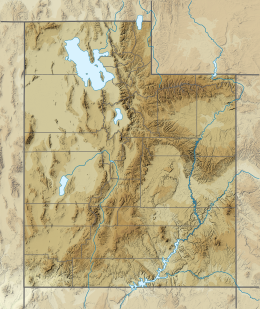1921 Sevier Valley earthquake

| UTC time | 1921-09-29 14:12:00 |
|---|---|
| USGS-ANSS | ComCat |
| Local date | 29 September 1921 |
| Local time | 07:12 a.m. MDT |
| Magnitude | Mw6.3 |
| Epicenter | 38°41′N 112°09′W / 38.68°N 112.15°W |
| Areas affected | Utah |
| Max. intensity | MMI VIII (Severe) |
| Landslides | multiple |
| Aftershocks | >35 |
| Casualties | 2 injured |
The 1921 Sevier Valley earthquake was a series of three earthquakes. The primary quake was a magnitude Mw6.3 earthquake that occurred on Thursday, 29 September 1921 at approximately 7:12 AM MT in Elsinore, Utah, United States. The first aftershock occurred in the evening on the same day, and a second aftershock occurred two days later on 1 October. No people were killed in the quake or in the subsequent aftershocks.
Earthquake
[edit]The primary earthquake struck on Thursday 29 September 1921 at approximately 7:12 AM MT in Elsinore, Utah, United States, lasting for 7–10 seconds.[1][2][3] This quake was preceded by several weeks of smaller quakes.[3] A major aftershock occurred on the same day at approximately 7:30 PM MT, and a second major aftershock occurred on Saturday, 1 October at approximately 8:32 AM MT.[3]
Magnitude and intensity
[edit]The initial quake was a Mw6.3 and an intensity of VIII ("Severe").[1][3][4] The official USGS report in their historical earthquakes list stated a magnitude of Mw5.2 and an intensity of VIII ("Severe").[2][5][6] An official USGS report published in 1988 assigned the modified magnitude of Mw6.3.[3] It was felt in an area of between 2,500 square kilometers (970 sq mi) and 5,100 square kilometers (2,000 sq mi), which is considered a small area for a quake of this size.[2][3] The farthest distance from the epicenter for the felt area was 25 miles (40 km). The quake lasted several seconds.[7]
The first major aftershock was a Mw5.7 and an intensity of VII ("Very Strong").[3] The epicenter was at the same location as the initial quake, and the felt area was similar.[3] The second major aftershock was the same magnitude and intensity as the initial quake, was in the same location, and felt in a similarly sized area.[3] This quake was reported as "quick and short as the detonation of a cannon".[3] The quakes were felt as far north as Salina and as far south as Marysvale.[1]
Destruction
[edit]Damage to chimneys and brick walls from the initial quake was "considerable".[3] Over US$100,000 in damage were caused (over US$1.44 million in 2020) by the primary quake.[8][9]
The town of Elsinore, reported sunken foundations, damaged roofs from collapsing chimneys and brick walls, and brick, adobe, and stone buildings were significantly damaged.[4] More than half of the residences in the town were seriously damaged, a dozen were damaged enough to be condemned, and most residences received some cracking and plaster damage.[3] The newly built schoolhouse had walls collapse and a damaged roof, causing it to have to be rebuilt.[7][8] Damage in Monroe included collapsed pipe trenches, cracked buildings, and the hot springs at the town turned "blood red" from iron oxide.[1][3] Large boulders were dislodged and some landslides were reported in canyons near Monroe.[1]
The first major aftershock—in the evening on the same day—did further damage to structures, especially those already affected by the primary quake.[1][3] Structures in Monroe received significantly more damage from this aftershock.[3] Damage was also reported in Richfield.[1]
On 1 October, the second major aftershock destroyed many of the damaged buildings, including a paint store in Elsinore. It also caused new damage to undamaged buildings, and caused previously damaged buildings to be completely destroyed.[1][3] More large boulders were dislodged and additional landslides were caused in various canyons near the affected towns.[1] Monroe was especially hard hit, with almost all chimneys being destroyed and many buildings being damaged beyond repair.[1] A man seated high on a bank of a river was thrown down to the edge of the river, the hot springs were discolored by iron oxide again, and the Monroe City Hall was "shattered".[3]
No people were killed in the quake, though at least two were injured by falling bricks or plaster.[3]
References
[edit]- ^ a b c d e f g h i j Peterson, Sheryl (10 January 2020). "1921 – Elsinore, UT (series) – M 6 ±". University of Utah. Archived from the original on 20 April 2020. Retrieved 4 May 2020.
- ^ a b c "M 5.2 - Utah - Utah Overview". United States Geological Survey. Retrieved 4 May 2020.
- ^ a b c d e f g h i j k l m n o p q r Hopper, Margaret G. (4 April 1988). "Large Earthquakes in Sevier County, Utah, in 1901 and 1921" (PDF). United States Geological Survey. Open-File Report 88-404. Archived (PDF) from the original on 12 February 2017. Retrieved 4 May 2020.
- ^ a b Dunn, Scott (9 October 2012). "5 biggest earthquakes ever to happen in Utah". KSL.com. Archived from the original on 18 March 2020. Retrieved 1 May 2020.
- ^ "M 5.2 - Utah Impact Summary". United States Geological Survey. Retrieved 4 May 2020.
- ^ "M 5.2 - Utah - Utah Technical Summary". United States Geological Survey. Retrieved 4 May 2020.
- ^ a b "Utah is shaken by earthquake" (PDF). The Lehi Sun. 6 October 1921. p. 7. Retrieved 4 May 2020.
- ^ a b "Summary of Newspaper Articles" (PDF). University of Utah. Archived (PDF) from the original on 21 April 2020. Retrieved 4 May 2020.
- ^ "$100,000 in 1921 → $1,441,983.24 today". Official Data Foundation. Archived from the original on 4 May 2020. Retrieved 4 May 2020.
